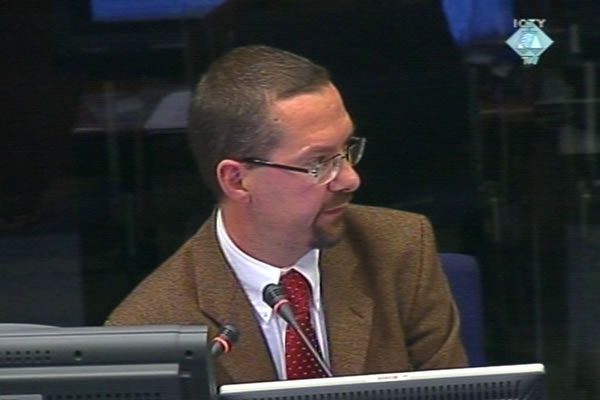Home
SERB MUP ‘WAS ILLEGAL IN THE POSITIVE SENSE’
Radovan Karadzic continues his cross-examination of Christian Nielsen, who studied the creation and operation of the Serb police. Karadzic tried to prove that the Serb side was in favor of keeping ‘peace at all costs’. The ‘illegal’ efforts of the RS MUP to arm the Serbs in fact had a ‘positive connotation’, he went on to say
 Christian Nielsen, witness at the Radovan Karadzic trial
Christian Nielsen, witness at the Radovan Karadzic trial Radovan Karadzic continued his cross-examination of prosecution expert Christian Nielsen. Karadzic contends that the Serbian Democratic Party acted ‘legally’ before the conflict broke out and advocated ‘peace at all costs’. Contrary to that, the Democratic Action Party worked together with ‘businessmen, rich people, criminals and police officers’ to establish ‘a secret Muslim army’.
Karadzic insisted on the ‘irregularities’ in pre-war joint police, which ‘were a threat’ to the Serb ethnic community in BH. The Serbs working in the BH MUP told Karadzic about it and ‘pressured’ him because they wanted him to make sure that the personnel policy would be ‘respected’ in the talks with Izetbegovic and Kljuic, the SDA and HDZ leaders. The SDA nevertheless brought in personnel from Sandzak and sent its police officers to Croatia for training funded by the United Arab Emirates.
‘Is it normal that in a common state where we share power and live side by side, the SDA sends its police officers to another country that started the war against the Serbs’, Karadzic asked the witness. Nielsen didn’t comment on Karadzic’s claim that the ‘war against Serbs broke out’ in Croatia in 1991, stressing that at the same time Serb police officers went to Pancevo in Serbia for training.
Nielsen also noted that the RS MUP described the process of arming Serbs before the conflict in April 1992 as ‘illegal’ in a number of different documents. All three ethnic groups in BH were working on establishing their armed formations, the witness added, but dismissed Karadzic’s claim that the Serbs came ‘late’ to the process and that they ‘were defending” themselves against the Muslimswho purportedly wanted the entire BH for themselves.
Karadzic tried to prove that the term ‘illegal’ in fact had a ‘positive connotation’. The term was used in the same sense as it was used in World War II, to denote the members of the resistance against the German occupying forces, Karadzic explained. As the witness said in response, if indeed the use of the term implied that an occupying force was present, one could conclude that the Serb MUP saw the joint MUP as a body they ‘wanted to undermine’.
The witness also dismissed Karadzic’s suggestion that the RS MUP in fact ‘defended the heritage of the partisans’: they wanted BH to remain in the former Yugoslavia. The documents Nielsen studied showed that the Serbs considered the communist heritage ‘harmful’, and labeled its followers ‘Commies’. Nielsen basically agreed with Karadzic that the Serbs ‘defended the Yugoslav idea’, but because they considered Yugoslavia a state in which all Serbs were united in a single territory.
According to Karadzic, in his analysis Nielsen didn’t take into consideration the documents that favor the Serb side. Karadzic suggested that the witness was ‘part of a team’ that ‘collected evidence about the sins of the Serb side’, instructed by the prosecution. The witness dismissed the claims, noting that his task was not to ‘write in favor of the Serbs or against them’ but to explain the way in which the Republika Srpska MUP operated from November 1990 to the end of 1992.
Karadzic will continue cross-examining Christian Nielsen tomorrow.
Linked Reports
- Case : Karadzic
- 2011-07-07 THE ‘BIRTH’ OF SERB POLICE AND ITS FIRST RESULTS
- 2011-07-06 PROSECUTION EXPERT ON THE SPLIT IN BH MUP
- 2011-07-06 SUBPOENA TO BH ARMY COMMANDERS
- 2011-07-13 POLICE “COMBED THEIR HAIR” AS THE VILLAGE BURNED
- 2011-07-14 ‘MADNESS’ IN BRCKO
- 2011-07-15 MIROSLAV TUDJMAN MUST MEET WITH KARADZIC’S DEFENSE
